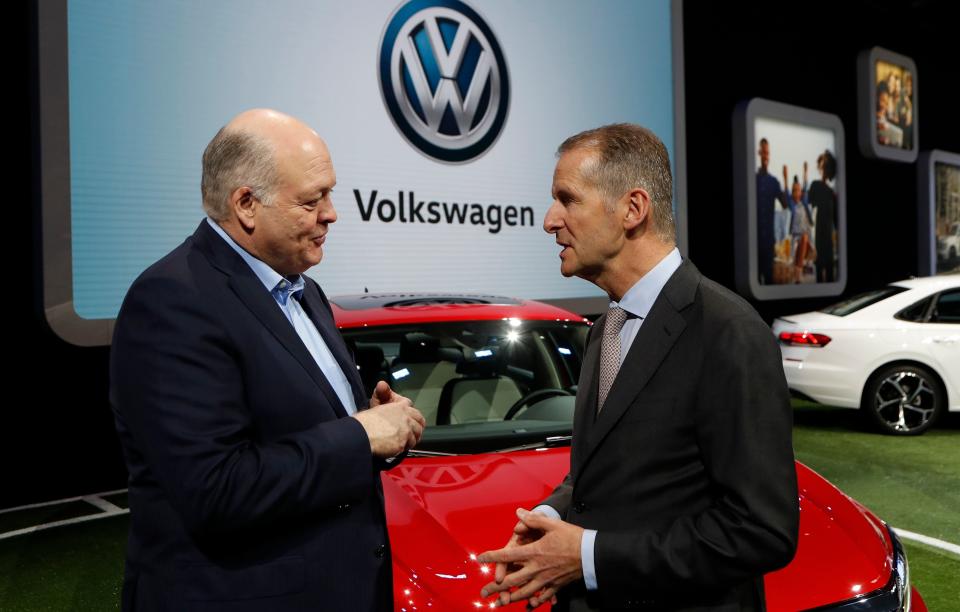Ford, VW form alliance to develop commercial vans, pickups globally for 2022
After an intense courtship that began in the summer of 2018, Ford Motor Co. and Volkswagen AG announced Tuesday that the car companies are moving ahead together on delivering medium pickup trucks for global customers starting in 2022, with plans to follow up with commercial vans in Europe.
The agreement is expected to provide scale and efficiency savings for both companies starting in 2023.
In addition, Ford and Volkswagen said they are committed to exploring potential collaboration on electric vehicles, driverless vehicles and mobility services.

“Over time, this alliance will help both companies create value and meet the needs of our customers and society," said CEO Jim Hackett in a news release. "It will not only drive significant efficiencies and help both companies improve their fitness, but also gives us the opportunity to collaborate on shaping the next era of mobility."
VW CEO Herbert Diess said: "Volkswagen and Ford will harness our collective resources, innovation capabilities and complementary market positions to even better serve millions of customers around the world. At the same time, the alliance will be a cornerstone for our drive to improve competitiveness."
Company leaders offered further comments in a conference call Tuesday morning, coinciding with the second day of the Detroit auto show, officially called the North American International Auto Show.
"Ford will build medium-size pickups for both companies. Ford will engineer and build larger commercial vans for commercial customers," Hackett said during the call, noting that VW would develop and build a city van.
“It’s my opinion you can’t do this alone," he said.
Both Ford and VW reaffirmed that the alliance does not involve "cross-ownership."
The alliance will be governed by a joint committee led by Hackett and Diess that will include executives from both companies.
In recent days, Ford and Volkswagen and other carmakers have talked about the challenges that face the manufacturing industry, from tariffs to changing consumer demands to a slowdown in the Chinese market.
This is all part of a global trend that requires alliances to save money and become more competitive and includes partnerships with technology companies to offset the costs of making tech-savvy cars that accommodate consumer expectations.
"We love to work together with the Ford guys. They are really serious and professionals," Diess told the Free Press Monday.
"Volkswagen is a really big car company worldwide, a big car company, but we are not as big in small commercial vehicles," Diess said. Ford is strong in trucks, "so we decided to join forces there. And we will become very, very competitive together in this segment — which consists of small commercial vans and small and midsize pickup trucks."
Combining forces would strengthen Ford and Volkswagen, Diess said.
Ford and Volkswagen both have strong commercial van and pickup business worldwide, with nameplates such as the Ford Transit family and Ranger as well as the Volkswagen Transporter, Caddy and Amarok, the companies noted.
A release said the companies’ collective light commercial vehicle volumes from 2018 totaled approximately 1.2 million globally, which could represent the industry’s highest-volume collaboration as production scales.
"The alliance will enable the companies to share development costs, leverage their respective manufacturing capacity, boost the capability and competitiveness of their vehicles and deliver cost efficiencies, while maintaining distinct brand characteristics," the news release said Tuesday. "Through the alliance, Ford will engineer and build medium-sized pickups for both companies which are expected to go to market as early as 2022. For both parties, Ford intends to engineer and build larger commercial vans for European customers, and Volkswagen intends to develop and build a city van."
Hackett added in the call: "Right now, Ford does not anticipate any workforce reduction in any of the Ford plants as a result of this collaboration. "
On Monday, asked whether Volkswagen might one day build vehicles in U.S. Ford factories, an idea he raised last month, Diess said, "It might be a possibility in the future."
Specifically asked about building Audi in the U.S., he said, "This is under consideration. Not yet decided."
Hackett had indicated in a Bloomberg TV interview Sunday that Ford-branded vehicles might be built in European Volkswagen plants one day, as well.
Ford Executive Chairman Bill Ford said Monday: “There is a very strong future for manufacturing in North America. We are a global company. That won’t change.”
Investors and industry analysts continue monitoring events with interest.
"The Volkswagen-Ford partnership is emblematic of what we are seeing in the industry," said Michelle Krebs, executive analyst for Autotrader. "While we are moving toward a world of electric vehicles, autonomous vehicles and mobility services, we don’t know when they will take hold.
"In the meantime, automakers are spending massive amounts of money with no clear path to turning profits. VW and Ford can share costs, as GM and Honda are doing on autonomous vehicles, for instance. I expect we will see more of such partnerships between automakers and automakers with tech companies."
In addition to all the recent developments revealed so far, Scott Keogh, president and
This article originally appeared on Detroit Free Press: Ford, VW form alliance to develop commercial vans, pickups globally for 2022

